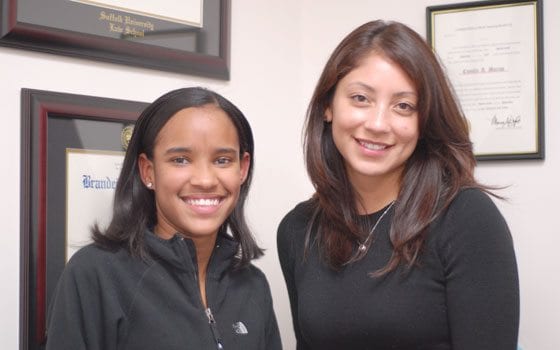
According to research published this year by the Mauricio Gastón Institute for Latino Community Development and Public Policy at UMass-Boston, Latino enrollment in Massachusetts public schools has increased by 22.7 percent over the last five years, making them the fastest-growing group of enrollees.
But Latinos have the highest rates of absence of any ethnic group in the state. They also rank first in the rate of in-school suspensions, in which disruptive students are taken out of class and supervised by an educator in the school building, and second in out-of-school suspensions, in which students are told they cannot come to school.
“The result is that Latino children are missing a tremendous amount of schooling,” according to the study.
Latinos have the highest dropout rate of any ethnic group in the state. More than one-quarter of Latino students that start the ninth grade in Massachusetts high schools drop out before graduation. That contributes to the lowest high school graduation rate of any Massachusetts ethnic group — 57 percent.
“They’re trying to orient themselves into a new society and it’s difficult for them, so they just drop out,” says Mora.
De Los Santos says she was lucky to have a family that gave her no other option than to study hard and go to college.
“That’s your job,” she says, explaining her mom’s frame of mind. “You don’t work, you have to do good in school.”
But even though she has plenty of support, transitioning from a Dominican to an American setting was hard for De Los Santos. American culture struck her as “very, very different,” and looking back, she wishes she had learned English at an earlier age.
“At first I thought [taking classes in Spanish] helped me because I didn’t know English and I was comfortable with other Hispanic kids,” she says. “But I feel it ended up hurting me … because I ended up learning English in sixth grade, seventh grade.”
This situation is becoming increasingly common in Massachusetts. The Latino population in the Commonwealth has grown consistently since 1960. According to a Gastón Institute study, it “more than tripled” between 1980 and 2000, and today numbers 479,000.
Education plays an important role because children make up a greater percentage of the Latino population (38 percent) than of the state overall (25.4 percent). Among children younger than 5, says the Gastón Institute, “the difference is even sharper.” The proportion of Latinos is almost twice as high as the general population that age — 10.8 percent compared to 6.3 percent.
One factor serving to widen the educational gap for Latinos is that the group also has lower wages. Latinos remain concentrated in low-paying and low-skill professions and are underrepresented in high-wage and professional positions, which “has significant implications for the economic wellbeing of Latino families,” according to the Gastón study.
Even worse, this income gap is a persistent problem. Despite overall increases in the amount of money workers are taking home, says the study, “Latino families are consistently lagging behind the state median in terms of income.”
That’s why Marcos decided to become a mentor. In the past, she has been a tutor and has taught sixth-grade mathematics in the Washington Heights neighborhood of New York City, where she was born and raised. Almost all of the students were Dominican, she says.
“They speak Spanish, and this is New York City,” she remembers. “I know the need that there is [for mentoring].”
Marcos and De Los Santos were fast friends. They share Dominican heritage (Marcos’ mother is Dominican) and are friendly, ambitious and dedicated.
“The more I learned about her, the more I saw myself in her,” says Marcos.
For De Los Santos, the mentoring relationship also meant having someone outside of her family circle to whom she could open up.
“With [Marcos] I got really comfortable,” she says. “And it was fun to have someone younger [than] your parents who you can talk to about pretty much anything.”
The open, supportive relationship enables Marcos to help De Los Santos learn from her mistakes, and the student to not only accept responsibility, but rise to the occasion and succeed.
The result, says Marcos, is a youngster who is more prepared to face professional challenges — and who has inherited a desire to give back.
“I help her and she will have an appreciation of this relationship in mentoring, so she, therefore, will help those after her, and hopefully those will help those who come after them,” says Marcos.
It’s already started: From September through May, De Los Santos volunteered at the Dudley and the South End branches of the Boston Public Library, helping children do their homework for at least four hours a week.
“That’s what’s so great about these programs,” says Marcos. “[They are] perpetuating a cycle of mentoring and helping others.”
While their official mentoring activities end when De Los Santos graduates from high school, both Marcos and her mentee say this is just the beginning.
“I’ll be there for her through college, law school, when she gets her first job, when she gets married or has kids,” says Marcos. “My relationship with Massiel will never end.”






